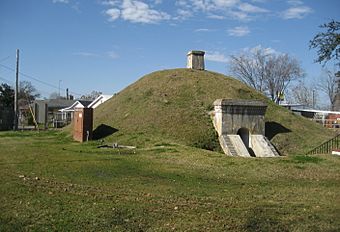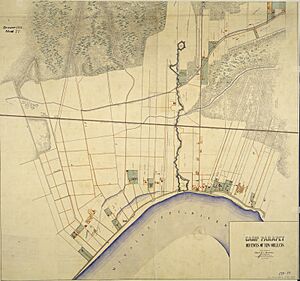Camp Parapet facts for kids
Quick facts for kids |
|
|
Camp Parapet Powder Magazine
|
|

The Camp Parapet powder magazine in 2008
|
|
| Location | 2812 Arlington Street, Jefferson, Louisiana |
|---|---|
| Area | 0.7 acres (0.28 ha) |
| Built | 1861 |
| Built by | Major Martin Luther Smith |
| Architect | Major Benjamin Buisson |
| NRHP reference No. | 77000671 |
| Added to NRHP | May 24, 1977 |
Camp Parapet was a fort built during the American Civil War. It was located in Shrewsbury, Louisiana, near New Orleans. This fort was meant to protect New Orleans from attacks coming up the Mississippi River.
Contents
History of Camp Parapet
The fort was a long line of defenses. It stretched about 1.75 miles from the Mississippi River to Metairie Ridge. The land further north was mostly swamp back then. The Confederate army built it to stop Union forces.
However, the Union navy attacked New Orleans from a different direction. Because of this, Camp Parapet was never actually used in a battle. After the Union forces captured New Orleans, they took over the fort. They made it even stronger. They wanted to defend against any possible Confederate counter-attack. But no such attack ever happened.
Under Union control, Camp Parapet became an important place. Many formerly enslaved people, known as "contraband," came to the camp. They were seeking freedom and safety. A Union officer named George H. Hanks helped organize them. He created groups to help repair and strengthen the camp. This work later grew into a larger organization. It eventually became part of the Freedmen's Bureau. This bureau helped formerly enslaved people after the war.
Union soldiers also trained at Camp Parapet. In 1863, a new group was formed there. It was called the 1st Regiment Louisiana Engineers. These engineers played a key role. They helped build and maintain military structures. Later, this regiment was split into two. They became the 1st and 3rd Regiment Engineers, Corps d'Afrique. These units were made up of African American soldiers.
What Remains of Camp Parapet
Most of Camp Parapet is gone today. But a few important parts still exist.
The Powder Magazine
The only building left from the fort is the powder magazine. This was a safe place to store gunpowder. It is made of brick and covered by a mound of earth. You can find it near Causeway Boulevard. It is now part of a small park. This magazine was added to the National Register of Historic Places in 1977. This means it is a special historical site.
Cemetery Site
Close to the magazine is the historic Shrewsbury (Camp Parapet) Cemetery. This was once the camp's cemetery. About 7,000 Union soldiers were buried here. Later, their bodies were moved to the Chalmette National Cemetery.
Images for kids
 | Georgia Louise Harris Brown |
 | Julian Abele |
 | Norma Merrick Sklarek |
 | William Sidney Pittman |





